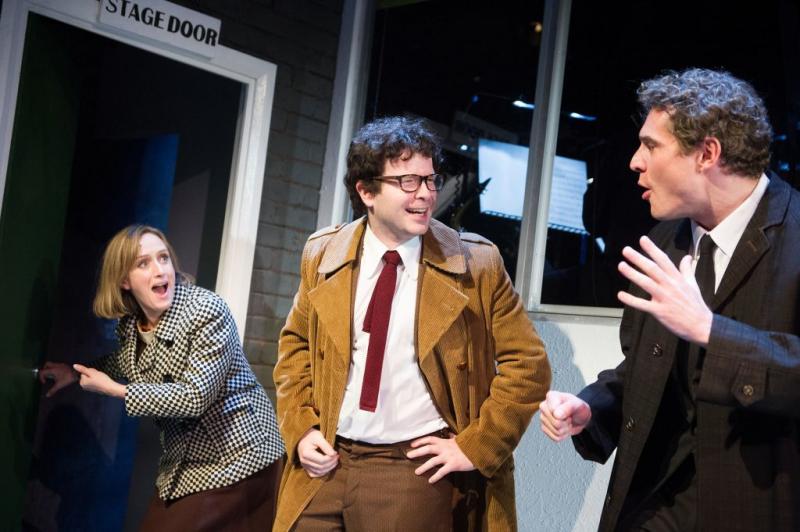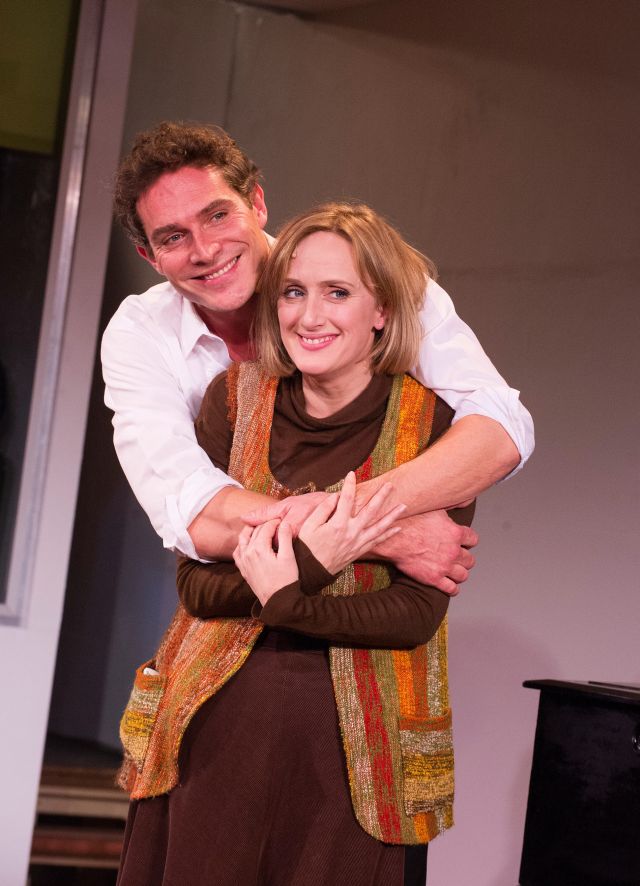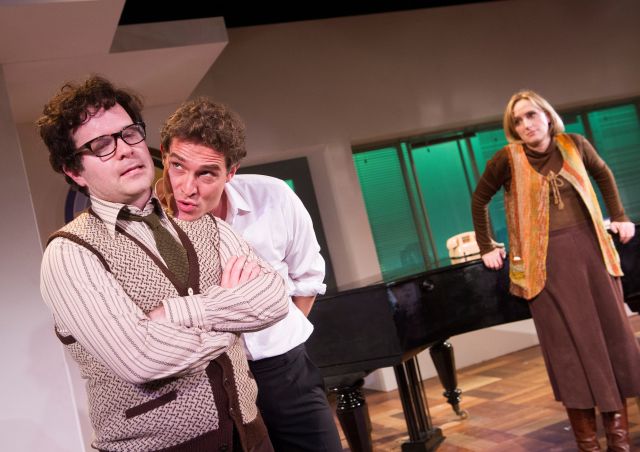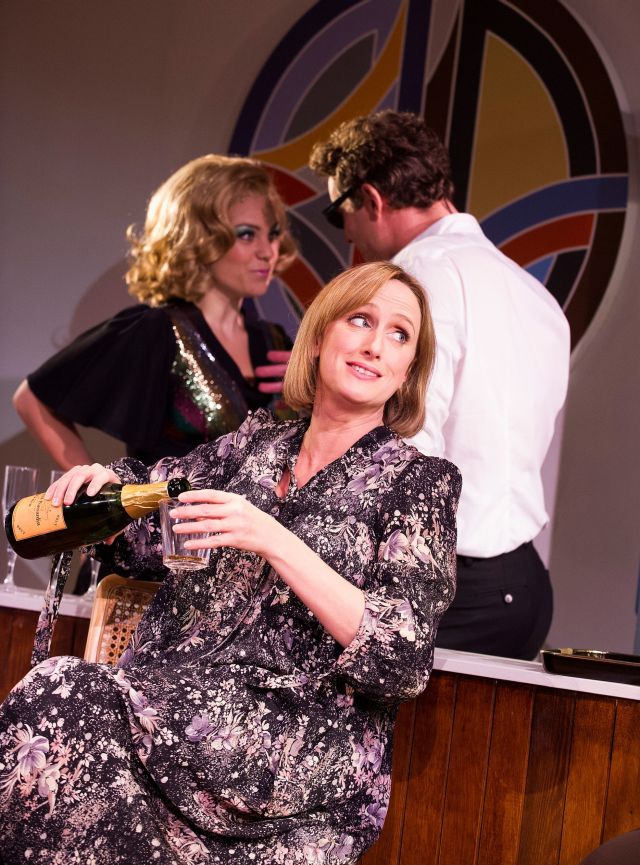Merrily We Roll Along, Menier Chocolate Factory | reviews, news & interviews
Merrily We Roll Along, Menier Chocolate Factory
Merrily We Roll Along, Menier Chocolate Factory
In the directing debut of Maria Friedman, Sondheim's onetime Broadway flop soars anew

On Broadway, Merrily We Roll Along remains forever scarred as the Stephen Sondheim musical that ground to an abrupt halt, closing after two weeks in 1981.
Marking her professional directing debut with a piece about rewinding the years, Friedman has chosen a musical that tallies with her own past. Amazingly, it's some two decades ago since I travelled to the Leicester Haymarket to see this actress/singer play the gradually embittered, ever-lovesick Mary Flynn in the first professional UK airing of a musical that Friedman returned to as director several years back, this time with Central School students. And here she is once again approaching material with an empathy and rigour that suggest a revision to the old adage about writing what you know. On the directing front, at least when it comes to Merrily, it's no bad thing to know this tricky yet potentially devastating piece inside out.
 For starters, there's the issue of which Merrily you decide to do, Sondheim's collaboration with the late George Furth (the composer's colleague previously on Company) having by this point accrued as many versions of itself as Hamlet. Gone is the high-school framing device (not to mention an opening song, "Rich and Happy") preferred by Michael Grandage, who led Merrily to London glory a dozen years ago. Book-ending Friedman's approach is the solitary image of Mark Umbers' searchingly played Franklin Shepard (pictured above, with Jenna Russell as Mary) in unspoken crisis. The question emanating from this superb actor's anguished eyes is taken up by Sondheim's lyric ("how did you get there from here?") and embedded in a piece that travels back 23 years to a once-hopeful past: what use all the world's lucre if in the process you waylay your soul?
For starters, there's the issue of which Merrily you decide to do, Sondheim's collaboration with the late George Furth (the composer's colleague previously on Company) having by this point accrued as many versions of itself as Hamlet. Gone is the high-school framing device (not to mention an opening song, "Rich and Happy") preferred by Michael Grandage, who led Merrily to London glory a dozen years ago. Book-ending Friedman's approach is the solitary image of Mark Umbers' searchingly played Franklin Shepard (pictured above, with Jenna Russell as Mary) in unspoken crisis. The question emanating from this superb actor's anguished eyes is taken up by Sondheim's lyric ("how did you get there from here?") and embedded in a piece that travels back 23 years to a once-hopeful past: what use all the world's lucre if in the process you waylay your soul?
One abiding fascination with Merrily pertains directly to its creators, men at the time of the show's inception riding wave upon wave of success, putting their talents to work on material that wonders aloud as to the price of glory? And, of course, even within a show whose title is as crushingly ironic as this one, there's an added irony to our knowledge that its much-lamented premiere put a halt to just the sort of ongoing collaboration featured within the piece itself: since Merrily, Sondheim and his mightiest of directorial collaborators, Harold Prince, have worked together only once.
 The Franklin we see at the start - a beginning, given this show's structure, that is also its ending - is an in-demand Hollywood player with both the industry and all womankind at his feet. Gone missing along the way are his thrusting musical theatre aspirations, his family (he scarcely sees his son), and the bonds of friendship that were forged on the Sputnik-era New York rooftop where the narrative eventually lands, the shimmering buoyancy of the show's closing number, "Our Time", amplified by our awareness of the betrayals, heartache, and more that would afflict these innocents inhabiting that too-brief Elysium before life's abrasions come to call. (That rude awakening is itself a Sondheim constant, and one could imagine all three of this show's principals - pictured above - revisiting it someday in the same composer's Follies.)
The Franklin we see at the start - a beginning, given this show's structure, that is also its ending - is an in-demand Hollywood player with both the industry and all womankind at his feet. Gone missing along the way are his thrusting musical theatre aspirations, his family (he scarcely sees his son), and the bonds of friendship that were forged on the Sputnik-era New York rooftop where the narrative eventually lands, the shimmering buoyancy of the show's closing number, "Our Time", amplified by our awareness of the betrayals, heartache, and more that would afflict these innocents inhabiting that too-brief Elysium before life's abrasions come to call. (That rude awakening is itself a Sondheim constant, and one could imagine all three of this show's principals - pictured above - revisiting it someday in the same composer's Follies.)
Frank is easily the show's toughest part: like the self-inquisitive bachelor Bobby in Company, he's a man more acted upon than active, and Umbers's considerable achievement is to make us bleed for a character whom a lesser approach would summarily dismiss; he's not a malign figure, just a weak one, and surely it's no accident that the film we hear tell of at the start is entitled Darkness Before Dawn, which pretty much recaps the story that will roll bumpily along before us. Umbers conveys both qualities: the yearning composer on the brink of possibility whose life clouds over in front of our eyes.
 The other main roles are the ones that tend to win prizes (as, indeed, did Daniel Evans and Samantha Spiro at the Donmar), and they are both here taken with surpassing skill. Looking unrecognisably geeky as the Marx Brother whom time forgot, the clarion-voiced Damian Humbley delivers easily the most electrifying "Franklin Shepard, Inc" in my experience, a solo number that moves from comedy to cruelty to amount to an on-air "slaughter" that in an instant stops a decades-long friendship sort. The most seasoned Sondheimian of the trio, the astonishing Jenna Russell lets us unpick the layers of self-loathing and regret that come to consume the once-avid writer, Mary, the years piling on both weight and drink as she makes war, not peace, with the fact that her beloved Frank will never be hers. (The moment late on where they first meet and Frank impetuously announces that he may just have found his wife is properly tumultuous.)
The other main roles are the ones that tend to win prizes (as, indeed, did Daniel Evans and Samantha Spiro at the Donmar), and they are both here taken with surpassing skill. Looking unrecognisably geeky as the Marx Brother whom time forgot, the clarion-voiced Damian Humbley delivers easily the most electrifying "Franklin Shepard, Inc" in my experience, a solo number that moves from comedy to cruelty to amount to an on-air "slaughter" that in an instant stops a decades-long friendship sort. The most seasoned Sondheimian of the trio, the astonishing Jenna Russell lets us unpick the layers of self-loathing and regret that come to consume the once-avid writer, Mary, the years piling on both weight and drink as she makes war, not peace, with the fact that her beloved Frank will never be hers. (The moment late on where they first meet and Frank impetuously announces that he may just have found his wife is properly tumultuous.)
Among the rest, Josefina Gabrielle changes hairstyle, voice, and confidence to present a scarily complete view of the much-married Gussie, the Broadway diva who wraps the ever-pliable Frank around her pitiless fingers, and Glyn Kerslake makes an especially vivid Joe Josephson, Gussie's marital discard to whom it falls to tell the budding songwriting team of Charley and Frank, "Give me a melody" - a charge often levelled at Sondheim by his detractors, here contained within arguably his most richly melodic and open-hearted score. (Indeed, his melodies on several occasions fill in the ellipses that will forever attend Furth's book.)
Is the production perfect? Not entirely. Fresh from winning a 2012 Evening Standard Theatre Award, Soutra Gilmour's set seems as blandly antiseptic as her costumes are hyper-consciously busy, and Tim Jackson's choreography has a pro forma air about it, notwithstanding a protracted tap sequence to open the second act. (The show-within-the-show, "Musical Husbands", isn't accidentally named, either.) It's difficult, too, in a piece where they are collectively billed in one number as "the blob" for the ensemble to avoid caricaturing their various split-second assignments, though perhaps that only throws attention back where it belongs: namely, on a fearless trio of leading players and their utterly attuned director. "Gives you the shivers," Frank remarks near the close, as, emotionally, this Merrily in every way does.
- Merrily We Roll Along at the Menier Chocolate Factory until 23 February
rating
Buy
Explore topics
Share this article
Add comment
The future of Arts Journalism
You can stop theartsdesk.com closing!
We urgently need financing to survive. Our fundraising drive has thus far raised £49,000 but we need to reach £100,000 or we will be forced to close. Please contribute here: https://gofund.me/c3f6033d
And if you can forward this information to anyone who might assist, we’d be grateful.

Subscribe to theartsdesk.com
Thank you for continuing to read our work on theartsdesk.com. For unlimited access to every article in its entirety, including our archive of more than 15,000 pieces, we're asking for £5 per month or £40 per year. We feel it's a very good deal, and hope you do too.
To take a subscription now simply click here.
And if you're looking for that extra gift for a friend or family member, why not treat them to a theartsdesk.com gift subscription?
more Theatre
 Ragdoll, Jermyn Street Theatre review - compelling and emotionally truthful
Katherine Moar returns with a Patty Hearst-inspired follow up to her debut hit 'Farm Hall'
Ragdoll, Jermyn Street Theatre review - compelling and emotionally truthful
Katherine Moar returns with a Patty Hearst-inspired follow up to her debut hit 'Farm Hall'
 Troilus and Cressida, Globe Theatre review - a 'problem play' with added problems
Raucous and carnivalesque, but also ugly and incomprehensible
Troilus and Cressida, Globe Theatre review - a 'problem play' with added problems
Raucous and carnivalesque, but also ugly and incomprehensible
 Clarkston, Trafalgar Theatre review - two lads on a road to nowhere
Netflix star, Joe Locke, is the selling point of a production that needs one
Clarkston, Trafalgar Theatre review - two lads on a road to nowhere
Netflix star, Joe Locke, is the selling point of a production that needs one
 Ghost Stories, Peacock Theatre review - spirited staging but short on scares
Impressive spectacle saves an ageing show in an unsuitable venue
Ghost Stories, Peacock Theatre review - spirited staging but short on scares
Impressive spectacle saves an ageing show in an unsuitable venue
 Hamlet, National Theatre review - turning tragedy to comedy is no joke
Hiran Abeyeskera’s childlike prince falls flat in a mixed production
Hamlet, National Theatre review - turning tragedy to comedy is no joke
Hiran Abeyeskera’s childlike prince falls flat in a mixed production
 Rohtko, Barbican review - postmodern meditation on fake and authentic art is less than the sum of its parts
Łukasz Twarkowski's production dazzles without illuminating
Rohtko, Barbican review - postmodern meditation on fake and authentic art is less than the sum of its parts
Łukasz Twarkowski's production dazzles without illuminating
 Lee, Park Theatre review - Lee Krasner looks back on her life as an artist
Informative and interesting, the play's format limits its potential
Lee, Park Theatre review - Lee Krasner looks back on her life as an artist
Informative and interesting, the play's format limits its potential
 Measure for Measure, RSC, Stratford review - 'problem play' has no problem with relevance
Shakespeare, in this adaptation, is at his most perceptive
Measure for Measure, RSC, Stratford review - 'problem play' has no problem with relevance
Shakespeare, in this adaptation, is at his most perceptive
 The Importance of Being Earnest, Noël Coward Theatre review - dazzling and delightful queer fest
West End transfer of National Theatre hit stars Stephen Fry and Olly Alexander
The Importance of Being Earnest, Noël Coward Theatre review - dazzling and delightful queer fest
West End transfer of National Theatre hit stars Stephen Fry and Olly Alexander
 Get Down Tonight, Charing Cross Theatre review - glitz and hits from the 70s
If you love the songs of KC and the Sunshine Band, Please Do Go!
Get Down Tonight, Charing Cross Theatre review - glitz and hits from the 70s
If you love the songs of KC and the Sunshine Band, Please Do Go!
 Punch, Apollo Theatre review - powerful play about the strength of redemption
James Graham's play transfixes the audience at every stage
Punch, Apollo Theatre review - powerful play about the strength of redemption
James Graham's play transfixes the audience at every stage
 The Billionaire Inside Your Head, Hampstead Theatre review - a map of a man with OCD
Will Lord's promising debut burdens a fine cast with too much dialogue
The Billionaire Inside Your Head, Hampstead Theatre review - a map of a man with OCD
Will Lord's promising debut burdens a fine cast with too much dialogue

Comments
Just as a matter of fact, the
I first saw this in the back
Where can I get a recording
A download will be available
A download will be available after the screenings on 23 December: http://www.digitaltheatre.com/production/details/merrily-we-roll-along-s...
As far as I know, there isn't a soundtrack, though I'd welcome one as much as you.